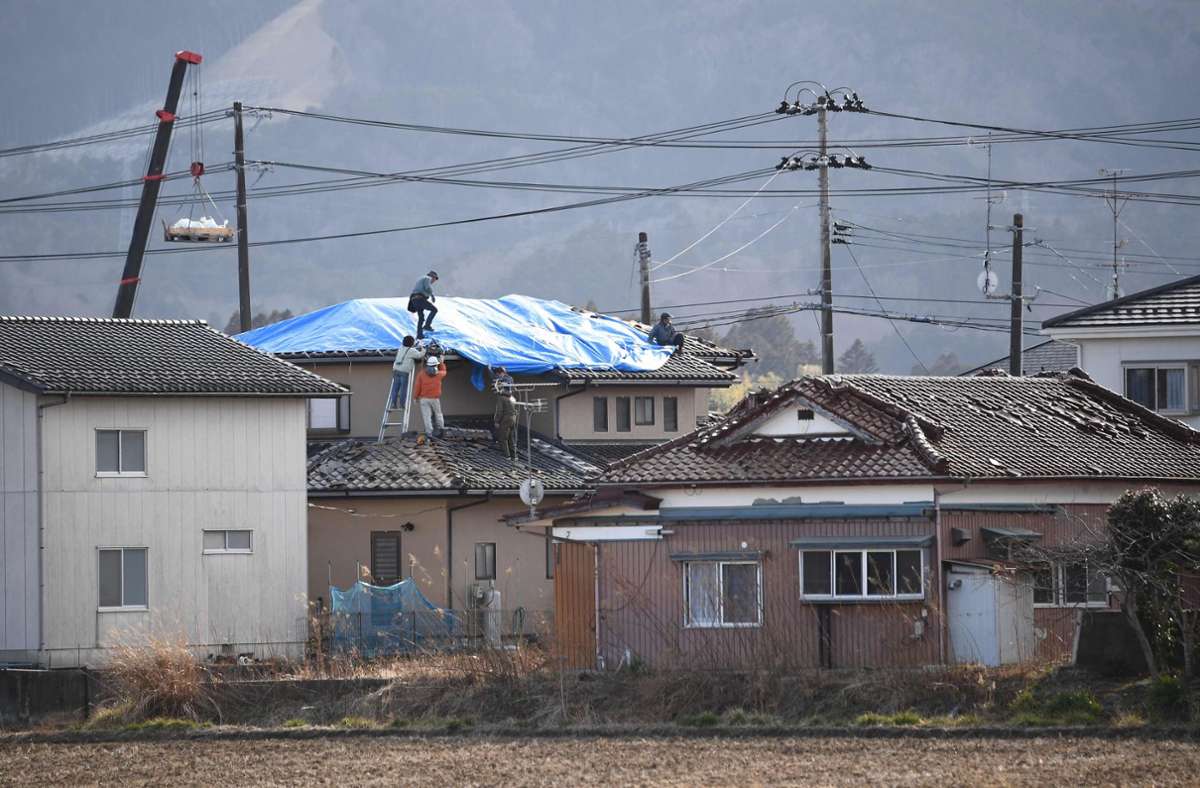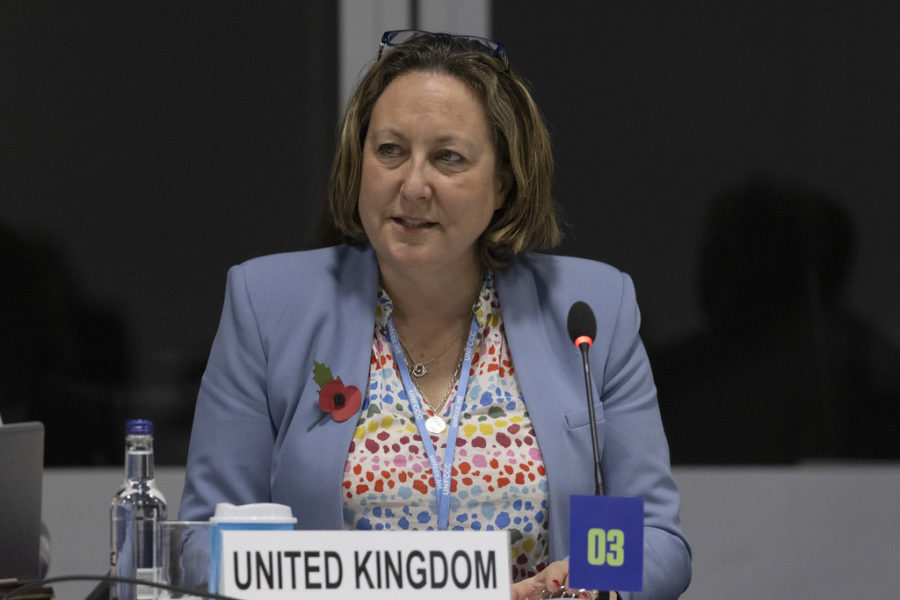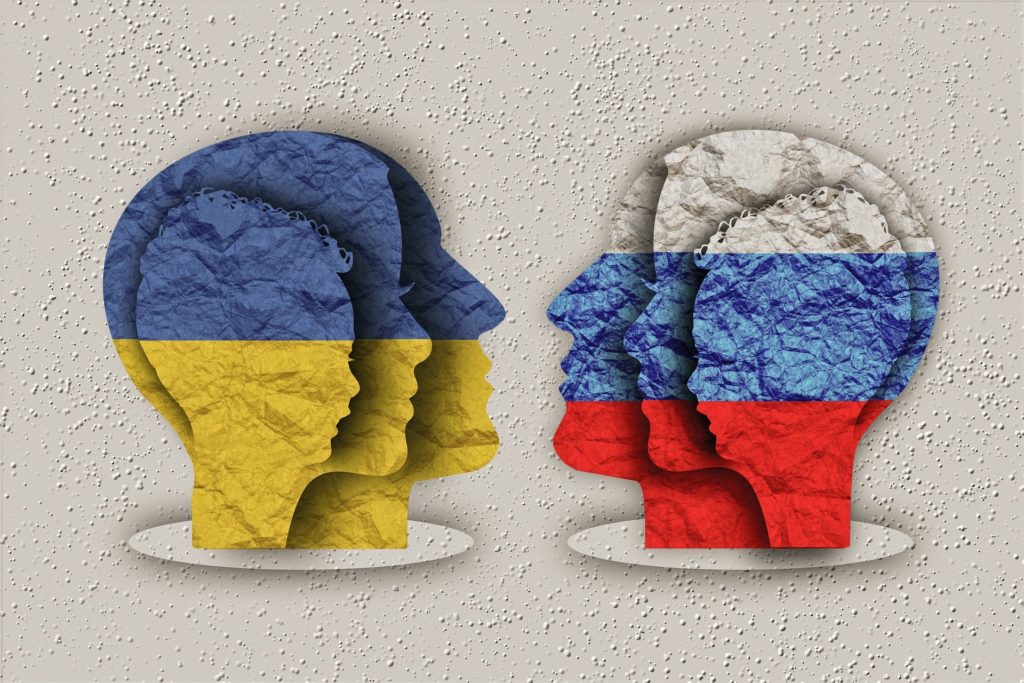Großbritannien ist sehr enttäuscht über die Haltung Indiens zum Einmarsch Russlands in der Ukraine, betrachtet das Land aber weiterhin als wichtigen Handelspartner, sagte Handelsministerin Anne-Marie Trevelyan am Donnerstag.
Auf die Frage, ob Indiens Haltung Auswirkungen auf die Handelsgespräche mit Großbritannien haben werde, sagte Trevelyan: “Wir sind sehr enttäuscht. Wir arbeiten weiterhin mit unseren indischen Partnern zusammen.” “Indien ist ein unglaublich wichtiger Handelspartner für Großbritannien … wir werden weiterhin mit Ländern auf der ganzen Welt zusammenarbeiten, um sicherzustellen, dass Putin diesen Krieg in Zukunft nicht mehr finanzieren kann”, sagte sie gegenüber Reportern.
Ein starkes Erdbeben im Nordosten Japans hat nach offiziellen Angaben mindestens zwei Tote und 160 Verletzte gefordert, aber nur relativ geringe Schäden verursacht. Zwei Millionen Haushalte waren zunächst ohne Strom, und ein Hochgeschwindigkeitszug entgleiste, doch wurde keiner der Fahrgäste verletzt. Die japanische Meteorologiebehörde hob am Donnerstagmorgen die Tsunami-Warnung auf.
Das Beben der Stärke 7,4 ereignete sich in demselben Gebiet wie das Beben, das 2011 die Nuklearkatastrophe von Fukushima ausgelöst hatte, doch wurde es nach offiziellen Angaben diesmal nicht beschädigt.
In einigen Gebieten war das Beben so stark, dass die Menschen nicht mehr stehen konnten, und in der Hauptstadt Tokio wackelten die Gebäude. Das Beben ereignete sich am Mittwoch um 23:36 Uhr (14:36 Uhr GMT) in einer Tiefe von 57 Kilometern (35,4 Meilen), teilten die japanischen Behörden mit. Sie warnten vor möglichen Nachbeben in den Präfekturen Fukushima, Miyagi und Yamagata.
Unmittelbar nach dem Ereignis gab die japanische Wetterbehörde für Teile der Nordostküste eine Tsunami-Warnung von einem Meter heraus, die jedoch am Donnerstagmorgen zurückgenommen wurde, nachdem Wellen von einem Drittel dieser Höhe die Küste erreicht hatten. Im Nordosten Japans wurden mehrere Menschen durch herabfallende Gegenstände oder bei Stürzen verletzt, und in der Stadt Soma in der Präfektur Fukushima kam nach Angaben lokaler Medien ein Mann in den Sechzigern ums Leben. Ein zweiter Todesfall wurde aus der Präfektur Miyagi gemeldet.

Einigen Medienberichten zufolge starben vier Menschen bei dem Beben, aber der Regierungssprecher Hirokazu Matsuno sagte, die Zahl der direkt durch das Beben verursachten Todesfälle werde noch bestätigt. In 14 Präfekturen, darunter auch in der Region Tokio, war die Stromversorgung von mehr als 2,2 Millionen Haushalten vorübergehend unterbrochen, aber am Vormittag war die Stromversorgung in den meisten Orten wiederhergestellt, wie der örtliche Stromversorger mitteilte. Glück im Unglück hatten die Insassen eines Hochgeschwindigkeitszuges, der bei dem Beben nördlich von Fukushima entgleiste – zum Glück war er nicht schnell unterwegs und niemand wurde verletzt. Die Passagiere und das Personal waren vier Stunden lang an Bord gefangen, bevor sie sich befreien konnten.
Japans Premierminister Fumio Kishida sagte vor Reportern, die Regierung versuche immer noch, das Ausmaß der Schäden abzuschätzen, und die Behörden erklärten, die Notdienste seien mit Anrufen überschwemmt worden. Die Gebäude in Tokio wurden mehr als zwei Minuten lang erschüttert. Weiter nördlich in Fukushima waren die Erschütterungen wesentlich stärker.
In Ishinomaki in der Präfektur Miyagi erklärte ein Beamter der Stadt gegenüber der Nachrichtenagentur AFP, er sei von einem “extrem starken Beben” geweckt worden.
“Ich hörte, wie der Boden rumpelte. Anstatt mich zu fürchten, erinnerte ich mich sofort an das Große Ostjapanische Erdbeben”, sagte er und bezog sich dabei auf die Katastrophe von 2011.
Das Erdbeben vom Donnerstag ereignete sich fast 60 km vor der Küste von Fukushima, nicht weit entfernt vom Epizentrum des stärksten Erdbebens in der Geschichte Japans, bei dem vor 11 Jahren 18.000 Menschen ums Leben kamen. Das Erdbeben von 2011 löste einen Tsunami aus, zerstörte das Kernkraftwerk Fukushima und löste eine große Katastrophe aus, nachdem Strahlung aus der Anlage ausgetreten war.
Die Atomaufsichtsbehörden erklärten, dass nach dem Erdbeben am Mittwochabend keine Anomalien in der beschädigten Anlage in Fukushima festgestellt worden seien.
Der ukrainische Staatschef beschuldigte Moskau am Donnerstag, eine neue Mauer des Kalten Krieges quer durch Europa “zwischen Freiheit und Unfreiheit” zu errichten, während seine Regierung erklärte, dass russischer Beschuss 21 weitere Zivilisten getötet habe. Drei Wochen nach ihrer verheerenden Invasion wurden die russischen Streitkräfte auch beschuldigt, ein Theater bombardiert zu haben, in dem viele Zivilisten untergebracht waren und das mit dem Wort “Kinder” gekennzeichnet war. Kiew kam nach einer 35-stündigen Ausgangssperre zu neuen Szenen der Zerstörung, da die russischen Truppen im Rahmen ihrer langsam voranschreitenden Offensive versuchen, die ukrainische Hauptstadt einzukreisen.
NATO-Generalsekretär Jens Stoltenberg hat für nächste Woche ein Gipfeltreffen der 30 Staats- und Regierungschefs der Militärorganisation einberufen, um den Krieg Russlands gegen die Ukraine zu diskutieren.
Laut Stoltenberg wird das Gipfeltreffen am 24. März von US-Präsident Joe Biden geleitet und “die Folgen des russischen Einmarsches in der Ukraine, unsere starke Unterstützung für die Ukraine und die weitere Stärkung der Abschreckung und Verteidigung der NATO als Reaktion auf eine neue Realität für unsere Sicherheit” behandeln.
Die Pressesprecherin des Weißen Hauses, Jen Psaki, bestätigte, dass Biden zu den persönlichen Gesprächen mit den europäischen Staats- und Regierungschefs nach Brüssel reisen wird.
China hat mit dem größten Anstieg der COVID-19-Fälle seit dem Ausbruch in Wuhan zu kämpfen. Das Land meldete am Dienstag mehr als 5.200 neue Fälle, und etwa 30 Millionen Menschen sind derzeit unter Quarantäne gestellt. Nach Angaben der Nationalen Gesundheitskommission in China wurden in den letzten 24 Stunden 1.337 lokal übertragene Fälle gemeldet.
Nach Angaben der Gesundheitsbehörden wird der plötzliche Anstieg des Coronavirus in dem Land durch die hochgradig übertragbare BA.2-Unterlinie der Omicron-Variante, auch bekannt als “Stealth”-Omicron, verursacht.
European Youth Voice
your words, your opinions, your text online – an international online newspaper for young Europeans by young people
The European Market
Europe is still confronted with the refugee crisis, but there might have been a little change regarding the distribution of migrants. There had been a big argument between Western and Eastern Europe, because the East refused the arrangement of splitting
Read more
The most inspirational and heartbreaking European stories about immigrants
Have you ever heard about European Press Prize? The award for excellence in journalism is organized every year and journalist from all over the Europe are trying to win it. This year was quite unique because journalists decided to write
Read more
Peace for Everybody
During the last months, the young European Youth Voice’s reporters made many researches and thought a lot about a common European future – with our new neighbors from all over the world. Now it’s time to take action: After the
Read more
The European Market
Europe is still confronted with the refugee crisis, but there might have been a little change regarding the distribution of migrants. There had been a big argument between Western and Eastern Europe, because the East refused the arrangement of splitting
Read more
The most inspirational and heartbreaking European stories about immigrants
Have you ever heard about European Press Prize? The award for excellence in journalism is organized every year and journalist from all over the Europe are trying to win it. This year was quite unique because journalists decided to write
Read more
1
2
3
Previous
Next
Escape & Migration
School boys
The two sides of refugees’ education in Greece
“Today me and Katerina went to the refugees’ camp for our lesson and almost half the class was missing. We should have noticed what have happened because of the silence
Read more
The most inspirational and heartbreaking European stories about immigrants
Have you ever heard about European Press Prize? The award for excellence in journalism is organized every year and journalist from all over the Europe are trying to win it.
Read more
The Road Forward
As we are approaching the end of our term as an international project group we want to thank you for following our series of articles regarding the topic of escape
Read more
Our European Wishes
In the context of the refugee crisis we, as a project group of the European Youth Voice, organized an event to raise attention for the current European situation. In the
Read more
Culture, Politics & Identity
The art of Active Listening
Think about how many times you use the pronouns “I” and “me” in your every day life. How many times you have asked your friends and your colleagues to look
Who are you and what do you want?
I am a student. I am a journalist. I am a daughter. I am a sister. I am a best friend. I am a girlfriend. I am a woman. I am
Ostrava – Steel Heart of the Republic
Ostrava is the third largest town in the Czech Republic and the second largest urban agglomeration after the Czech capital city Prague. The city has been largely affected by exploitation
Society & Lifestyle
The art of Active Listening
Think about how many times you use the pronouns “I” and “me” in your every day life. How many times you have asked your friends and your colleagues to look
BULLYING
Nowadays we are facing millions of problems in our societies, some more serious than others .Well, one of the most controversial problems that can become bigger day by day is
Homophobia in post-soviet countries
This week we spent our time with people from eleven different countries in a youth exchange program organised by “European Youth Voice”. We shared a lot of stories and experiences
Road Safety In Europe – acording to Polish condition
road-safety-in-europe-acording-to-polish-condition
Travel & Abroad
My Hometown – Võru
Well, before you can hear about my hometown, try to pronounce it. It is pretty tough, I know. Only real Estonian will cope with it. So take your time and
Toletum-Toledo
Spain is very well known thanks to many of its historical cities, but there is one in which people can feel the presence of many different cultures in just a
Galicia: A warm and natural paradise
During the last European Youth Voice Seminar which took place in Madrid, we had several interesting presentations about the hometowns of each European participant. I would like to write this
Santarém – The Portuguese Gothic Capital
FACTS AND NUMBERS Area – 552.54 km2 Population – 63,563 Parishes – 18 Region – Ribatejo President – Ricardo Gonçalves (Social Democratic Party) Municipal Holiday – 19th March
Youth Unemployment
To follow or not to follow your dream
Have you ever asked yourself “Is this what I really want to do?” while listening to one of your professors in university giving a lecture? Do you ever have second
What is the most appropriate job for me?
This is one of the most important questions that every young person faces to while thinking about his/her future. The answer is difficult and sometimes wrong. The statistics show the
We are a resource, not a problem!
Members of FutureLab Europe provide the perspective of young people on the current crisis Europe’s youth has been hit hard by the economic crisis. Unprecedented levels of youth unemployment, emigration





